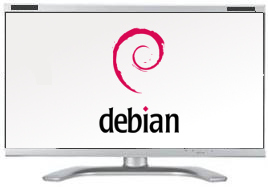Home Entertainment goes GNU/Linux!

I’m an Open Source advocate, so I was happy to learn that LG uses Open Source software for its model family 55LN5700 (the User Manual contained legal information about Open Source Software).
The best part is that it has a built-in browser (it seems to be webkit-based) and supports regular keyboard and mouse via a bluetooth dongle connected to one of the 3 available USB ports (I’m using a combined keyboard and mouse dongle from Logitech). This browser works fine for YouTube too.
There also is an LG App-Store for Games and other funny stuff, but since it requires a registered account, I haven’t tried that yet.
This TV also supports Media sharing from various PCs in the intranet via the DLNA system. There are at least two good Open Source DLNA servers are part of the Debian distribution.
The first one I tried is rygel, but had not much successes with it. It worked when I ran it as root, but failed for some reason when I wanted to run it as an unprivileged user. Also, it didn’t come with an init.d script.
The second server is minidlna, and I had immediate success with it. It is very lightweight and does an excellent job at serving media — all that is needed — and et even comes with an init.d script. Just do:
apt–get install minidlna
… and the server is up and running. Then I tweaked /etc/minidlna.conf in the following way:
- point
media_dirto the folder where your media (pictures, videos, music) lives on your hard drive. In my case, this is also a folder shared by Samba, so that everyone in the house can copy media there and immediately watch it on the TV. - Uncommented
log_diranddb_dir, but left the default values - As
root_containerI selected B, so that you can browse the actual directory structure - set
inotify=yes - set
notify_interval=60
Then restart the minidlna service. Browse to port 8200 of your server to see a short HTML status message about the number of indexed files.
Then I ran into a problem: Moving a new media file into the folder wasn’t recognized by minidlna. It is supposed to be informed by new media by inotify, but it wasn’t. I found the fix here. Stop the service, delete /var/lib/minidlna/files.db, then start the service again. Now minidlna is immediately informed about new media files.
Considering that most of the entertainment technologies out there are proprietary and closed, the chance of success of this little project was extremely slim, but here it is anyway: GNU/Linux media server on a mainstream TV!